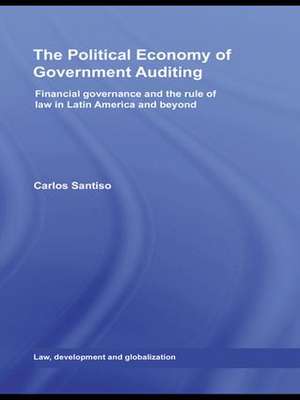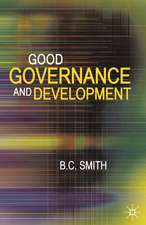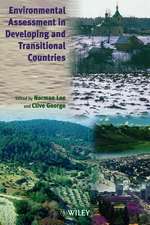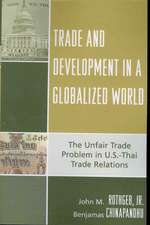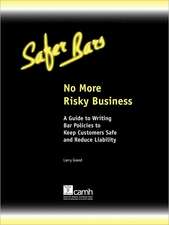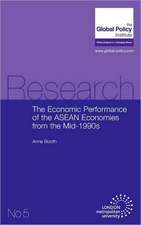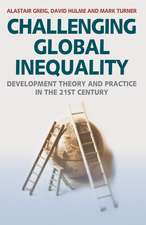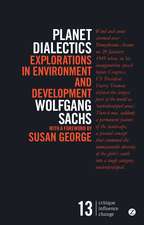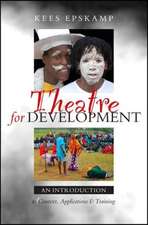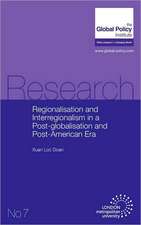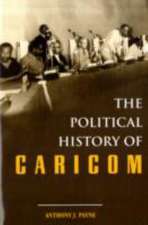The Political Economy of Government Auditing: Financial Governance and the Rule of Law in Latin America and Beyond: Law, Development and Globalization
Autor Carlos Santisoen Limba Engleză Paperback – iun 2016
An important contribution to the comparative study of governance institutions, and especially those tasked with overseeing the budget and curbing corruption, The Political Economy of Government Auditing will be of interest to scholars and students of comparative politics, development studies, administrative law, and public finance; as well as to development practitioners and policy-makers in developing countries, donor governments and international institutions.
| Toate formatele și edițiile | Preț | Express |
|---|---|---|
| Paperback (1) | 416.22 lei 6-8 săpt. | |
| Taylor & Francis – iun 2016 | 416.22 lei 6-8 săpt. | |
| Hardback (1) | 1166.68 lei 6-8 săpt. | |
| Taylor & Francis – 22 mai 2009 | 1166.68 lei 6-8 săpt. |
Din seria Law, Development and Globalization
-
 Preț: 419.11 lei
Preț: 419.11 lei -
 Preț: 197.85 lei
Preț: 197.85 lei -
 Preț: 469.34 lei
Preț: 469.34 lei -
 Preț: 414.32 lei
Preț: 414.32 lei -
 Preț: 483.12 lei
Preț: 483.12 lei - 18%
 Preț: 1286.61 lei
Preț: 1286.61 lei -
 Preț: 414.39 lei
Preț: 414.39 lei -
 Preț: 388.13 lei
Preț: 388.13 lei -
 Preț: 443.65 lei
Preț: 443.65 lei -
 Preț: 409.69 lei
Preț: 409.69 lei -
 Preț: 449.41 lei
Preț: 449.41 lei -
 Preț: 469.76 lei
Preț: 469.76 lei -
 Preț: 469.34 lei
Preț: 469.34 lei - 18%
 Preț: 1002.18 lei
Preț: 1002.18 lei - 15%
 Preț: 487.33 lei
Preț: 487.33 lei -
 Preț: 412.41 lei
Preț: 412.41 lei -
 Preț: 363.96 lei
Preț: 363.96 lei -
 Preț: 413.76 lei
Preț: 413.76 lei -
 Preț: 487.37 lei
Preț: 487.37 lei - 14%
 Preț: 303.01 lei
Preț: 303.01 lei -
 Preț: 367.66 lei
Preț: 367.66 lei - 9%
 Preț: 934.94 lei
Preț: 934.94 lei - 18%
 Preț: 1003.99 lei
Preț: 1003.99 lei -
 Preț: 388.90 lei
Preț: 388.90 lei - 15%
 Preț: 491.07 lei
Preț: 491.07 lei -
 Preț: 467.06 lei
Preț: 467.06 lei
Preț: 416.22 lei
Nou
Puncte Express: 624
Preț estimativ în valută:
79.64€ • 83.38$ • 65.90£
79.64€ • 83.38$ • 65.90£
Carte tipărită la comandă
Livrare economică 05-19 aprilie
Preluare comenzi: 021 569.72.76
Specificații
ISBN-13: 9781138989665
ISBN-10: 1138989665
Pagini: 208
Dimensiuni: 156 x 234 mm
Greutate: 0.45 kg
Ediția:1
Editura: Taylor & Francis
Colecția Routledge-Cavendish
Seria Law, Development and Globalization
Locul publicării:Oxford, United Kingdom
ISBN-10: 1138989665
Pagini: 208
Dimensiuni: 156 x 234 mm
Greutate: 0.45 kg
Ediția:1
Editura: Taylor & Francis
Colecția Routledge-Cavendish
Seria Law, Development and Globalization
Locul publicării:Oxford, United Kingdom
Cuprins
Introduction: Budget Institutions and Financial Governance 1. Political Economy of Budget Oversight and External Auditing 2. Institutional Arrangements for External Auditing 3. The Board Model and the Case of Argentina 4. The Court Model and the Case of Brazil 5. The Monocratic Model and the Case of Chile 6. Government Auditing in Transition. Conclusions: Auditing, Accountability and Anticorruption
Recenzii
"This book is an important contribution to our understanding of how corruption can be prevented by strengthening those institutions tasked with scrutinizing government and overseeing public finances. It provides useful lessons to reformers in Latin America in their efforts to promote integrity in the use of public resources. These lessons of experience are also relevant for African countries pursuing the same objectives. "
Dr. Donald Kaberuka, President of the African Development Bank and former Minister of Finance of Rwanda
"Controlling corruption represents a fundamental challenge for all societies in their quest to improve the lives of the most vulnerable. Carlos Santiso eloquently demonstrates the importance of strengthening the institutions of integrity to combat corruption and, in particular, enhance transparency and accountability in public finances. His analysis of the role of audit agencies will undoubtedly help reformers around the world in the fight against corruption and hopefully inspire others to further enhance our knowledge of these overlooked oversight institutions."
Dr. Peter Eigen, Founder of Transparency International (TI) and Chairman of EITI
"Carlos Santiso brings into this book a unique experience that combines top positions in governmental and financial agencies, as well as in distinguished academic positions. These varied perspectives make for a book that will be indispensable reading for everyone interested in these issues."
Guillermo O’Donnell, Helen Kellogg Professor of Government and Senior Fellow of the Kellogg Institute for International Studies, Notre Dame University
"Carlos Santiso persuasively demonstrates that institutional design shapes the relationship between agents and principals in public budgeting. His application of agency theory to the audit function is especially valuable because of the assumed independence of auditors. His framework can be applied to relationships between politicians and officials in all areas of government work to further good governance and financial integrity."
Allen Schick, Governance Fellow, Brookings Institution, and Professor of Political Science, University of Maryland, College Park
"This book fills a void in the literature, with a serious treatment of external audit institutions in Latin America, encompassing the political economy issues that impact their effectiveness. This is a must read for those interested in reforming their own public financial management system and those supporting the development of better public finance systems. The lessons are universal, and provide a firm, pragmatic foundation for moving forward and important guidance for sequencing of reforms."
William L. Dorotinsky, Lead Public Sector Specialist, the World Bank
"The book stresses in various places that, inevitably, the effectiveness of audit agencies does not depend only on organizational factors but also, importantly, on the influence of political factors. For this reason these institutions cannot be copied from other countries and cannot be created over night. They must be created over a period of time and reflect the political reality of the countries. Dr. Santiso’s book is of particularly great value in this context."
Vito Tanzi, former Director of the Fiscal Affairs Department, International Monetary Fund
"With this book, Carlos Santiso breaks new ground in several areas – providing a unique, readable overview of the world of autonomous audit agencies, offering the first comparative study of their organization and operations, and simultaneously applying neo-institutional and political economy analysis to develop a theory on their impact on improving public resource management and combating corruption. The work should inspire others to consider these overlooked institutions in their own research agendas, but it will clearly remain a classic for some time."
Linn Hammergren, former Senior Public Sector Management Specialist, World Bank
"This is a fine piece of comparative analysis, combining academic research findings with policy advice on challenges that many developing countries face currently. Santiso’s book is an indispensable reading for scholars and practitioners looking for an inspiring read on a subject that otherwise finds itself enclosed in arcane technical literature."
Dr. Bruno Speck, Senior Advisor for Latin America, Transparency International
Dr. Donald Kaberuka, President of the African Development Bank and former Minister of Finance of Rwanda
"Controlling corruption represents a fundamental challenge for all societies in their quest to improve the lives of the most vulnerable. Carlos Santiso eloquently demonstrates the importance of strengthening the institutions of integrity to combat corruption and, in particular, enhance transparency and accountability in public finances. His analysis of the role of audit agencies will undoubtedly help reformers around the world in the fight against corruption and hopefully inspire others to further enhance our knowledge of these overlooked oversight institutions."
Dr. Peter Eigen, Founder of Transparency International (TI) and Chairman of EITI
"Carlos Santiso brings into this book a unique experience that combines top positions in governmental and financial agencies, as well as in distinguished academic positions. These varied perspectives make for a book that will be indispensable reading for everyone interested in these issues."
Guillermo O’Donnell, Helen Kellogg Professor of Government and Senior Fellow of the Kellogg Institute for International Studies, Notre Dame University
"Carlos Santiso persuasively demonstrates that institutional design shapes the relationship between agents and principals in public budgeting. His application of agency theory to the audit function is especially valuable because of the assumed independence of auditors. His framework can be applied to relationships between politicians and officials in all areas of government work to further good governance and financial integrity."
Allen Schick, Governance Fellow, Brookings Institution, and Professor of Political Science, University of Maryland, College Park
"This book fills a void in the literature, with a serious treatment of external audit institutions in Latin America, encompassing the political economy issues that impact their effectiveness. This is a must read for those interested in reforming their own public financial management system and those supporting the development of better public finance systems. The lessons are universal, and provide a firm, pragmatic foundation for moving forward and important guidance for sequencing of reforms."
William L. Dorotinsky, Lead Public Sector Specialist, the World Bank
"The book stresses in various places that, inevitably, the effectiveness of audit agencies does not depend only on organizational factors but also, importantly, on the influence of political factors. For this reason these institutions cannot be copied from other countries and cannot be created over night. They must be created over a period of time and reflect the political reality of the countries. Dr. Santiso’s book is of particularly great value in this context."
Vito Tanzi, former Director of the Fiscal Affairs Department, International Monetary Fund
"With this book, Carlos Santiso breaks new ground in several areas – providing a unique, readable overview of the world of autonomous audit agencies, offering the first comparative study of their organization and operations, and simultaneously applying neo-institutional and political economy analysis to develop a theory on their impact on improving public resource management and combating corruption. The work should inspire others to consider these overlooked institutions in their own research agendas, but it will clearly remain a classic for some time."
Linn Hammergren, former Senior Public Sector Management Specialist, World Bank
"This is a fine piece of comparative analysis, combining academic research findings with policy advice on challenges that many developing countries face currently. Santiso’s book is an indispensable reading for scholars and practitioners looking for an inspiring read on a subject that otherwise finds itself enclosed in arcane technical literature."
Dr. Bruno Speck, Senior Advisor for Latin America, Transparency International
Descriere
The Political Economy of Government Auditing addresses the elusive quest for greater transparency and accountability in the management of public finances in emerging economies; and, more specifically, it examines the contribution of autonomous audit agencies (AAAs) to the fight against corruption and waste.
